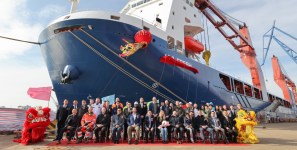2M Or Not 2M?
OPINIONS SPLIT ON WHAT CHANGES CARRIER MEGA-ALLIANCES WILL DELIVER FOR SUPPLY CHAINS
With the recent launch of a pair of new mega-alliances of global ocean carriers, major U.S. importers are divided as to whether industry consolidation will help or hurt in an age of larger vessels.
As the 2M Alliance of Maersk and Mediterranean Shipping Co. and the Ocean 3 Alliance among CMA CGM, China Shipping and United Arab Shipping Co. set sail, a supply-chain executive for Walmart—by far the nation’s largest retailer and importer—says he thinks the proliferation of carrier alliances ultimately will lead to stability and reliability.
“We operate a diversified import network that allows us to mitigate risk and effectively flow product to our stores,” says Bryan Most, Walmart’s vice president for Private Fleet. “While there will be an adjustment period for all parties as the new services become operational, in the long term we believe that the new alliance structures have the ability to bring the most stable, frequent and reliable services to the industry.”
The Home Depot’s executive vice president for Supply Chain and Product Development, Mark Holifield, is a bit more cautious.
“We support the carriers’ focus on efficiency and productivity,” Holifield says. “But having available capacity when and where we need it is very important to our business. We would hope that alliances won’t adversely impact that.”
An executive of another Top 10 U.S. importer, who asked not to be identified, tells Global Trade that he is concerned, commenting,
“Obviously the proliferation of the alliances and the usage of the larger ships have caused great difficulty to supply chains.
“We can no longer properly predict delivery times, terminals, chassis availability and communication,” he adds. “Everyone seems powerless to provide the service that shippers need to ensure product flow. This has forced us to work toward awarding ocean bids to those carriers who can control the vessel strings and the cargo that we have to move.”
The 2M and Ocean 3 alliances plus the G6 (APL, Hyundai Merchant Marine, MOL, NYK Line, Hapag-Lloyd and OOCL) and CKYHE (with Evergreen Line joining Cosco, Hanjin Shipping, “K” Line and Yang Ming) combine to control about 95 percent of ocean cargo volumes in major east-west global trades.
Speaking at the Shifting International Trade Routes Conference, presented Jan. 29-30 in Tampa, Florida, by the American Association of Port Authorities in cooperation with the U.S. Maritime Administration, Bruce Cashon, senior vice president and chief commercial officer of terminal operator firm NYK Ports LLC, says that one thing is for sure: “The uber-alliances clearly are here to stay.”
On the negative side, according to Cashon, is the “extreme stress” that megaships deployed by the alliances are putting on all operational aspects.
And AAPA Chairwoman Kristin Decas, chief executive officer of Port of Hueneme, Calif., says containers on alliance ships aren’t necessarily stowed in a manner that facilitates efficient offloading at port terminals, commenting, “They’re getting delivered Easter baskets.”





Leave a Reply